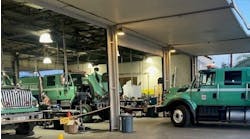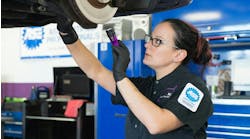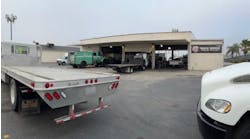The Trainer Overachiever: Joseph Russo, Fairfax County Department of Vehicle Services
Fleet Maintenance selected an Overachiever for six different categories based on reader nominations. This is the winner of the Trainer category. Click here to see the winner of the Technician category.
Joseph Russo has never romanticized working on vehicles, though he’s done it nearly 40 years. He did 25 years as an automotive line technician for domestic and import dealerships and independent shops. He candidly admitted he does it “to pay the bills.”
Ironically, Russo, as part of a three-man team responsible for quality inspections and training for the Fairfax County Department of Vehicle Services, has become rather good at igniting passion in other techs. The classes he instructs are open to the 240 Fairfax County techs and six surrounding municipalities. He taught 200 techs in total last year, reported Jonathan Mendez, a Fairfax DVS asst. superintendent who oversees quality assurance.
He also nominated Russo, who runs one-day, seven-hour classes that focus on electrical, air conditioning, air brakes, steering/suspension, and diesel engines. These serve as a primer for new techs and refresher for veteran ones. The county has about 6,000 assets, which includes 1,600 buses. Mendez noted Russo has improved and expanded the curriculum and will work one-on-one with techs, helping them study for ASE certifications.
“This in-house training is greatly cost effective, aids in production and fewer comebacks, and gives the tools our techs need to become ASE certified,” Mendez said.
Luckily for the Fairfax techs, understanding how things work, like electrical systems, is an area Russo does obsess about.
“I study this stuff all the time—I’m kind of a geek about it,” he said.
His goal is to be “able to explain it to somebody and not confuse them, and not get out over my skis.” Getting techs to understand how voltage drop tests work is one of his more personal crusades.
Read more: Technician shadowing: Why it's important and how to get started
Another focus is getting techs to “look at how to evaluate a part that may be on its way to failing and take that next step from preventative into predictive maintenance,” he said.
For example, he said early signs of bearing failure on a diesel truck’s accessory drive pulley might not be audible like it is on a car, but if left unchecked, could result in a breakdown and tow-in.
Russo replicates how he learned as a young tech trying to figure out how to troubleshoot vehicles at various auto dealerships.
“These were all instructor-led classes, so you had hands-on, you hit theory, and you had a human being who was experienced and could explain and answer your questions on the fly,” Russo explained. “To me, that’s the way it should be done. We’ve gotten away from that, with a lot of training done online.”
This tactile approach includes having the techs pull the armature out of an electric motor housing. They get to feel for themselves how powerful the magnetic fields are—and to respect them. “It’s a fairly small motor, but it’ll still leave a blood blister on your nail if you have your finger in there,” Russo said.
Not all learning has to be hands-on. Russo advocates turning to YouTube channels for high-level theory and animated examples of complex systems.
“There’s some brilliant minds on there,” Russo said, citing Weber State auto channel and online university courses, which helped Russo conceptualize how power supplies manipulate voltage. The best part is anyone can view these college courses, with time as their only cost. He also mentioned online professional technician forums such as International Automotive Technicians Network and Diagnostic Network can be very helpful.
“The reality of it is that the stuff’s out there for free, and people are paying big money for it in the classroom,” Russo concluded, adding that to stay up on all the changing technology, “you have to make a personal time investment in your continuing education.”





